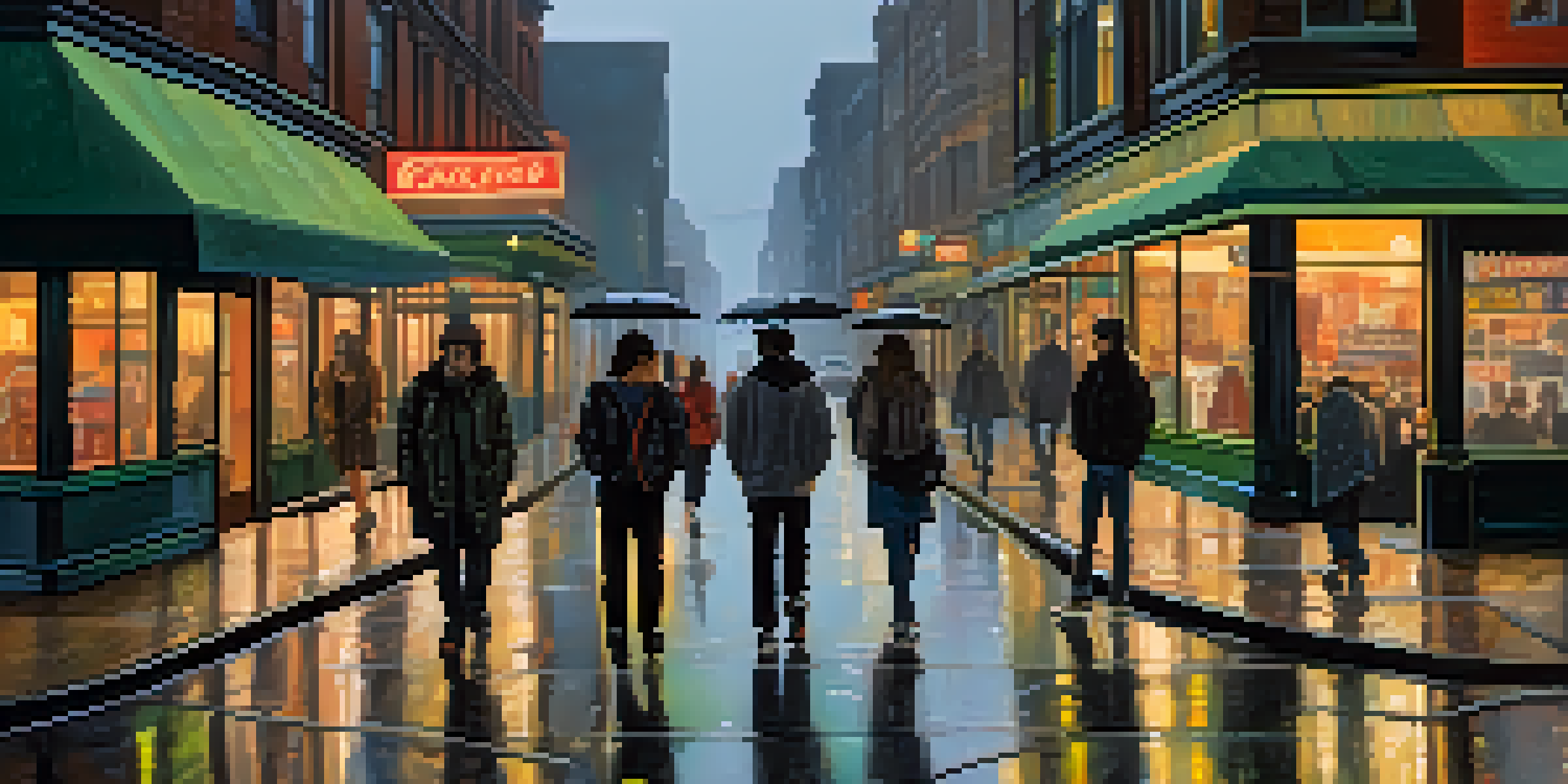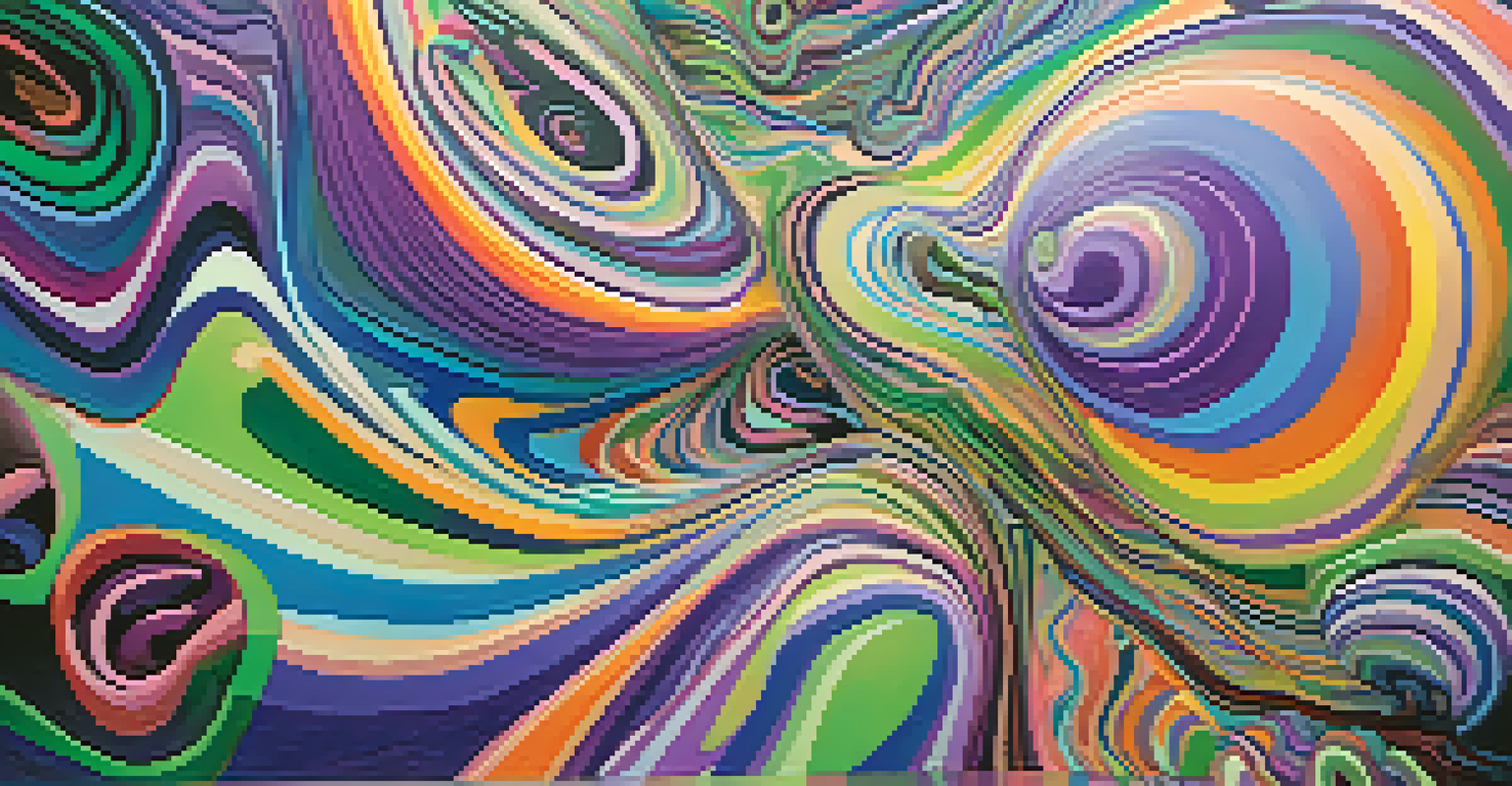The Connection Between Psychedelics and Grunge Music

The Rise of Grunge: A Cultural Revolution
Grunge music emerged in the late 1980s and early 1990s, primarily in Seattle. This genre wasn't just about music; it represented a cultural shift that resonated with disaffected youth. Bands like Nirvana and Pearl Jam captured the essence of a generation grappling with societal pressures, often reflecting feelings of angst and alienation.
Music is the shorthand of emotion.
As grunge took off, it became a voice for those who felt disconnected from mainstream values. The music's raw sound and honest lyrics provided an outlet for expressing deep emotions and frustrations. This authenticity resonated with many, making grunge not just a musical style but a lifestyle choice for countless fans.
The cultural backdrop of grunge included a rising interest in alternative lifestyles, including the exploration of psychedelics. This connection hints at a deeper quest for understanding and escapism that shaped both the music and its audience.
Psychedelics: A Brief Overview
Psychedelics are substances that alter perception, mood, and various cognitive processes. Common examples include LSD and psilocybin, which have long been associated with expanded consciousness and profound experiences. Many users report feelings of connectedness and insight, often leading to personal revelations or shifts in worldview.

Historically, psychedelics have been linked to various cultural movements, particularly the counterculture of the 1960s. Artists and musicians used these substances to push creative boundaries, and their influence persisted into the grunge era. This powerful connection between altered states of mind and artistic expression is crucial in understanding the grunge phenomenon.
Grunge as a Cultural Movement
Grunge music emerged in the early 1990s, reflecting the feelings of a disaffected youth and serving as a voice for those disconnected from mainstream values.
While some view psychedelics with skepticism, others see them as tools for exploration. This duality mirrors the complexity of grunge music, which often oscillated between darkness and light, reflecting the struggles and triumphs of its time.
Influential Grunge Artists and Psychedelic Inspiration
Many prominent grunge artists openly experimented with psychedelics, which influenced their music and lyrics. Kurt Cobain, frontman of Nirvana, often spoke about the impact of hallucinogenic experiences on his songwriting. His lyrics frequently touched on themes of confusion, pain, and enlightenment, echoing the psychedelic experience.
Psychedelics can help us see the world with fresh eyes, allowing for deeper understanding and connection.
Similarly, Soundgarden's Chris Cornell and Alice in Chains' Layne Staley were known for their tumultuous relationships with drugs, including psychedelics. Their music often explored the darker sides of drug use, yet it also reflected moments of clarity and insight, akin to the revelations experienced during psychedelic trips.
These artists not only shaped the sound of grunge but also its lyrical depth, weaving in the complexities of drug culture. The result is a body of work that resonates with the highs and lows of both the human experience and the psychedelic journey.
The Connection Between Grunge and Psychedelic Culture
The overlap between grunge and psychedelic culture is evident in the themes of exploration and introspection. Both movements share a focus on breaking societal norms and challenging conventional thinking. Grunge's raw sound and psychedelic music's experimental nature both encourage listeners to seek deeper understanding.
Moreover, the visual art associated with both movements often reflects similar aesthetics, featuring surreal imagery and themes of existentialism. Iconic album covers and music videos from grunge bands frequently incorporate psychedelic elements, blurring the lines between reality and illusion.
Psychedelics Influence Grunge Artists
Many grunge musicians, like Kurt Cobain and Chris Cornell, openly experimented with psychedelics, which deeply influenced their songwriting and lyrical themes.
This synergy creates a rich tapestry of cultural expression, where grunge artists draw inspiration from psychedelic experiences while also critiquing the darker aspects of drug culture. The result is a complex dialogue that continues to influence music and art today.
The Impact of Psychedelics on Grunge Lyrics
Grunge lyrics often delve into themes of despair, disillusionment, and the search for meaning, which can be interpreted through the lens of psychedelic experiences. The introspective nature of psychedelics allows artists to tap into profound emotional depths, making their lyrics resonate with listeners on multiple levels.
For instance, Nirvana's 'All Apologies' reflects a sense of vulnerability and confusion, themes often explored in psychedelic states. The raw honesty in such lyrics invites listeners to confront their own feelings of inadequacy and isolation, creating a connection that transcends the music itself.
By integrating psychedelic influences into their songwriting, grunge musicians crafted narratives that captured the essence of a generation's existential struggle, leaving a lasting legacy that continues to inspire new artists.
The Cultural Legacy of Grunge and Psychedelics
The legacy of grunge music is deeply intertwined with the exploration of psychedelics, influencing subsequent genres and artists. This connection continues to inspire modern musicians who draw on the emotional depth of grunge and the creative expansion offered by psychedelics. Today's artists often echo the themes of struggle and enlightenment found in the grunge movement.
Furthermore, the resurgence of interest in psychedelics, particularly for therapeutic purposes, has reignited conversations around their role in creativity and self-discovery. This renewed focus invites a re-evaluation of the connections between music, mental health, and altered states of consciousness.
Legacy of Grunge and Psychedelics
The interplay between grunge and psychedelics has shaped music and cultural discussions around mental health and creativity, continuing to inspire modern artists.
As we reflect on the cultural impact of grunge and psychedelics, it's clear that their interplay has shaped not only music but also broader discussions about mental health, creativity, and the human experience.
Conclusion: The Enduring Bond of Psychedelics and Grunge
The connection between psychedelics and grunge music is a fascinating exploration of creativity, culture, and consciousness. As we look back on the grunge era, it's evident that the psychedelic influence played a significant role in shaping its sound and message. The raw, unfiltered expression found in grunge music continues to resonate, echoing the complexities of both artistic and personal journeys.
This bond reminds us of the power of music to provide solace and understanding in times of confusion and angst. As new generations discover the music and its ties to psychedelic culture, the conversation around mental health, creativity, and self-exploration continues to evolve.

Ultimately, the enduring legacy of grunge and its connection to psychedelics serves as a testament to the profound impact of art on the human experience, encouraging us to explore, question, and connect.